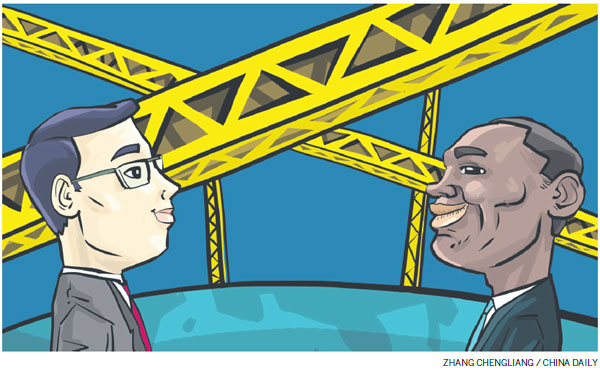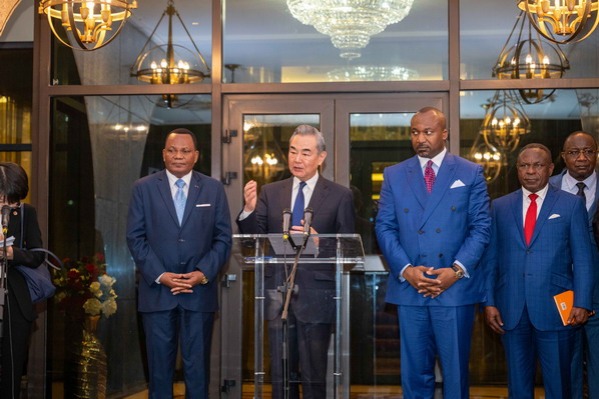China and Africa industrial capacity mode of cooperation

Sikhumbuzo Zondi, research assistant at the Institute for Global Dialogue associated with the University of South Africa.
In attempts to strengthen Africa's economic development, Beijing's China Foreign Exchange Reserves in association with the Export-Import Bank of China initiated the China-Africa Industrial Capacity Cooperation Fund as a mid- to long-term development investment fund. The formation of this fund was announced at the 2015 FOCAC (Forum on China-Africa Cooperation) in Johannesburg, South Africa.
The fund was designed to provide assistance in the construction of Africa's high-speed rail network, highway networks and regional aviation and industrialization. The main beneficiaries of the fund are sectors such as manufacturing, new technology, agriculture, energy and mineral industries, infrastructure development projects and financial cooperatives.
China-Africa industrial capacity cooperation has become a maxim as more and more African countries are zealous to espouse the epoch-making possibilities that are brought about by China's economic transformation and modernization. In this sense, African countries have become the center of Chinese overseas investments in order to stimulate their own industrialization strategies.

It appears there are shared necessities and mutual benefits between Africa and China in carrying out cooperation and a rare moment has appeared that can help Africa and China achieve win-win cooperation for mutual development. This strategy has the propensity of making the world more balanced, prosperous and stable, given its full potential of benefiting the people of Africa, China and the world at large through improved international trade and investment.
Furthermore, cooperation between Africa and China provides a vital opportunity for the African continent to break the cycle of aid dependency from Western donor countries and achieve sustainable development that is in line with their needs and conditions.
When African states started gaining political independence from European imperialists in the 1950s and 1960s, they sought to enhance economic development through foreign development aid that was championed by Western institutions and governments.
Nevertheless, by so doing most Western aid donors have been spoon-feeding African states instead of teaching them the technical expertise of socioeconomic development. Hence, most of the African continent remains destitute and underdeveloped, as most of this hard cash in the form of aid and loans has been feeding the stomachs of the continent's elites at the expense of the poor and vulnerable masses.
As such, Africa and China are now working together to amalgamate China's competitive industries with their high-quality industrial capacity to enhance Africa's industrialization and economic diversification. This mechanism takes into consideration that it is unfeasible to realize real political independence in the absence of economic independence.
Having said that, China has showed willingness to prioritize industrial partnering and industrial capacity cooperation with African countries in order to improve the continent's employment and skills. In this regard, China has committed to expedite Chinese private investments, provide technical assistance and facilitate local skills development programs.
Hitherto, China has completed a $250 million Hawassa Industrial Park project in Ethiopia, which has since attracted leading textile and garment companies, some of whom have begun exporting to the global market.
Moreover, China has sought to ameliorate Africa's agricultural capacity and productivity mainly by means of experience-sharing, skills and technical transfer, promotion of Chinese investments in African agriculture and creating new exchange frameworks and programs to bring Chinese experts into the African continent. China's involvement in Africa's agricultural sector aims at assisting African farmers competing well in the highly competitive global agricultural industry.
Additionally, the China-Africa industrial capacity cooperation mechanism is an attempt by both parties to assist African countries in the areas of taxation and foreign exchanges, achievement of technical expertise and mutual development. Both parties agree that underdeveloped infrastructure hinders the continent's prosperity, therefore China, as the world's second-biggest economy, has committed to take concrete measures to stimulate Chinese business and financial institutions into expanding investments in the continent through a number of schemes such as public-private partnerships and build-operate transfer.
These programs aim for African flagship projects such as infrastructure development in areas including railroads, regional aviation, seaports and harbors, water and electricity supplies, information and communication and other infrastructure projects that are essential in facilitating infrastructure connectivity and economic integration in Africa. All in all, the mechanism seeks to provide much needed technical know-how to African countries in order for them to eliminate the challenges that hinder their prospects of industrialization and development, such as poor infrastructure and skills shortages.
Going forward one might infer that industrialization is an inexorable path for Africa to achieve emancipation and inclusive development, and China's assistance to Africa has no terms and conditions attached to it, except the ultimate goal of improving people's livelihoods and capacity building. In addition, China-Africa cooperation will in future modernize Africa's industrial sector, which is the mainstay of economic growth and job creation.
Chinese investments in Africa's manufacturing sector will enable the continent to realize rapid economic growth and create new business opportunities and local partnerships, which will see Africa rise from the ashes of poverty and underdevelopment.
Finally, cooperation will put Africa in a commanding position in terms of world trade and industrial expansion given the partnerships' huge market size at its disposal.

































